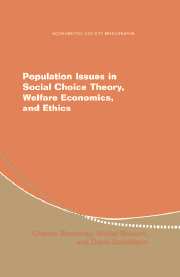Book contents
- Frontmatter
- 1 Introduction
- 2 Measurement of Individual Well-Being
- 3 Welfarist Social Evaluation
- 4 Fixed-Population Principles
- 5 Population Principles
- 6 Characterizations and Possibilities
- 7 Uncertainty and Incommensurabilities
- 8 Independence of the Existence of the Dead
- 9 Temporal Consistency
- 10 Choice Problems and Rationalizability
- 11 Applications
- References
- Author Index
- Subject Index
3 - Welfarist Social Evaluation
Published online by Cambridge University Press: 05 January 2013
- Frontmatter
- 1 Introduction
- 2 Measurement of Individual Well-Being
- 3 Welfarist Social Evaluation
- 4 Fixed-Population Principles
- 5 Population Principles
- 6 Characterizations and Possibilities
- 7 Uncertainty and Incommensurabilities
- 8 Independence of the Existence of the Dead
- 9 Temporal Consistency
- 10 Choice Problems and Rationalizability
- 11 Applications
- References
- Author Index
- Subject Index
Summary
Part A
An alternative is associated with three distinct pieces of information. The first is a list of the identities of those who ever live, the second consists of information about individual well-being as represented by a collection of utility functions, and the third is all the remaining information, which we call nonwelfare information. A principle for social evaluation uses some or all of this information to generate a social goodness relation that ranks the alternatives. For any two alternatives, one may be better than the other, the two may be equally good, or they may not be ranked at all, in which case we say they are incommensurable. In this chapter, however, we focus on complete social rankings and assume that principles provide orderings - reflexive, transitive, and complete rankings - of the alternatives (see Chapter 2, Sections 2.2 and 2.6, for a discussion). Incomplete social goodness relations (quasi-orderings) are investigated in Chapter 7.
In some of the arguments in this chapter, we allow the histories associated with the alternatives to change. In that case, we say there are multiple information profiles. This allows us to investigate important properties of principles for social evaluation without assuming the existence of a large number of alternatives.
- Type
- Chapter
- Information
- Publisher: Cambridge University PressPrint publication year: 2005



